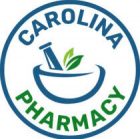
North Carolina
South Carolina
Sign up to our mailing list and never miss out on exclusive offers, tips and savings!
“Hi, I’m Dr. Taylor Fortson, your weight loss wonder woman! I will be helping you on your weight loss journey. I have your contact information and will reach out via email/phone within 48 hours. 🙂
In the meantime, you should be receiving a confirmation email from us (please check your junk and spam folders). If you would like to contact me directly, please email compounding@carolinapharmacy.com OR Schedule a virtual telehealth visit for weight loss by clicking here!”

Currently, only North Carolina Medicaid plans cover these rapid RT-LAMP COVID-19 tests. Check back here for updates in eligibility.
Thank you for your inquiry! A dedicated team member will be reaching out personally within 24 hours (likely within a few hours). Please be sure to check your junk and spam folders. If you would like a more immediate response or do not hear from us, please email support@carolinapharmacy.com directly.